How to Import & Export Data Between Magento 2 & iCloud

We know for sure that there are many Mac and iOS users among merchants. It means that they may prefer iCloud to other file storages, but you cannot exchange data between Magento and iCloud with the help of default tools. Luckily, enhancing the standard import and export processes is no longer a problem. In our blog, we often share useful tips on how to eliminate the default limitations of the platform and get the necessary features. And below, we describe how to import and export entities between Magento 2 and iCloud.

Table of contents
- 1 How to Import & Export Data Between Magento 2 & iCloud
- 2 Improved Import & Export Magento 2 Extension Features
- 3 Final Words
How to Import & Export Data Between Magento 2 & iCloud
Since Magento 2 doesn’t let you exchange data via iCloud, it is necessary to install a replacement for the default import/export mechanism. And the missing functionality can be enabled with the help of a third-party extension. But how to choose the correct one? In the next chapter, where the process of selecting the most suitable Magento 2 import and export module. Try to find something interesting on ExtDN – Magento Extension Developers Network or the official marketplace, but don’t forget to check whether it satisfies the requirements listed below.
How to Choose Proper Import & Export Solution
While you may spend hours looking for a proper module, your research may be unsuccessful since the Magento ecosystem offers dozens of extensions of all sorts, including import and export tools. But only a few of them support iCloud as a connection point between your e-commerce website and external systems. Furthermore, most tools miss some vital features, that’s why we’d like to draw your attention to a list of requirements. Always take them into account when looking for an import and export module that enables proper data transfers between Magento 2 and iCloud or other external systems.
Multipurposeness
By multipurposeness, we mean the ability to combine both import & export processes. While the Magento ecosystem contains numerous extensions that offer only import or export, you should be careful selecting a new enhancement for your e-commerce store. Always read the list of features for every module you want to purchase.
If you install an import-only extension, it is necessary to expand it with the corresponding export-only solution. The necessity to use two modules instead of a single solution leads to numerous inconveniences, such as an additional purchase, installation, configuration, and exploration. And if the two extensions are developed by different vendors, it may cause conflicts.
With all these disadvantages in mind, we recommend you to avoid using single-purpose solutions and choose a universal import/export extension to run the Magento 2 iCloud integration.
Automation
Another feature that should be a part of every import/export solution is the ability to automate data transfers. The Magento 2 iCloud integration becomes way more user-friendly if you don’t participate in data exchanges on a daily basis. It is always better to configure the process and let the module do all the routine tasks for you instead of spending time on the same processes on a daily basis.
The default import/export tools lack automation. Furthermore, most third-party extensions either provide it with lots of limitations or miss this functionality. But by delegating your daily tasks to the module, you will get lots of spare time that can be spent on growing your business. Thus, data exchanges between Magento 2 and iCloud should be automated; and a reliable extension should not only combine import and export features but also automate data transfers.
Mapping
Why do we mention mapping functionality here? Because it is the part of the automation discussed above. Don’t let the situation when you can send data files with the default Magento 2 attributes to iCloud mislead you: it won’t be possible to provide them to a third-party system that relies on different attribute standards. At the same time, you cannot transfer any data from iCloud to Magento 2 with third-party attributes. Thus, no automation is possible unless your import/export tool offers decent mapping functionality. If a created mapping scheme can be saved and applied for further updates automatically, you will forever forget about headaches caused by different attribute standards.
Additional Connection Points
The Magento 2 iCloud integration is the key topic of this article, but we should also draw your attention to the fact that it is always better to rely on multiple connection points instead of the one mentioned here. The more alternatives to the Magento 2 iCloud integration you have – the more flexible you are. Since there are thousands of external systems and platforms, you may connect your e-commerce store to, and only a small amount of your partners rely on iCloud, you universal integrator should utilize other file storages or even direct data transfers.
What Magento 2 Import & Export Extension to Choose

Many years ago, long before Magento 2 was announced, we had been looking for a reliable import/export solution to replace the default tools. And the inability to find a fully-functional extension became a reason to develop our own tool. Meet the Improved Import & Export Magento 2 module – an extension that completely revamps the default import/export processes. Our tool offers the ability to transfer entities between Magento 2 and iCloud combining import & export features, allows automating data transfers (two ways are described below), provides a decent mapping interface as well as enables multiple ways of transferring data.
Now, let’s take a look at how to import and export data between Magento 2 and iCloud with the help of the Improved Import & Export Magento 2 module.
How to Import & Export Data Between Magento 2 & iCloud
While import and export processes for the Magento 2 iCloud integration are quite similar, we describe them separately to avoid possible incomprehension.
How to Import Data from iCloud to Magento 2
To import data from iCloud to Magento 2, do the following:
- Go to System -> Improved Import / Export -> Import Jobs.
- Hit ‘Add New Job’ to create a new import profile.
- Configure General Settings, Import Settings, and Import Behavior.
- In ‘Import Source,’ specify iCloud as your import source and configure parameters necessary to connect your e-commerce website to the cloud storage.
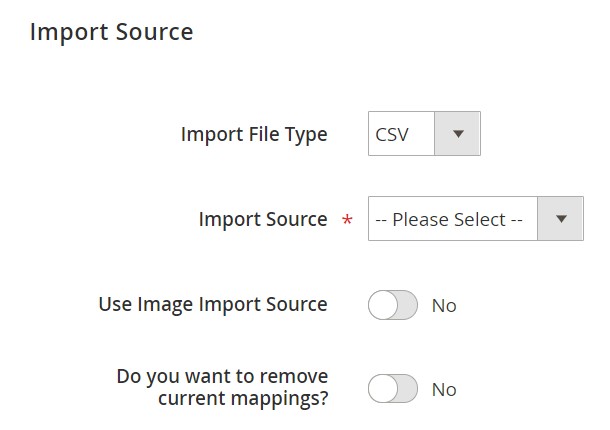
You must admit that importing data from iCloud to Magento 2 is quite simple.
How to Export Data from Magento 2 to iCloud
As for the data export from Magento 2 to iCloud, it looks as follows:
- Go to System -> Improved Import / Export -> Export Jobs.
- Hit ‘Add New Job’ to create a new export profile.
- Configure General Settings, Export Settings, Store Filter, and Export Behavior.
- In ‘Export Source,’ specify iCloud as your export source and configure parameters necessary to connect your e-commerce website to the cloud storage.
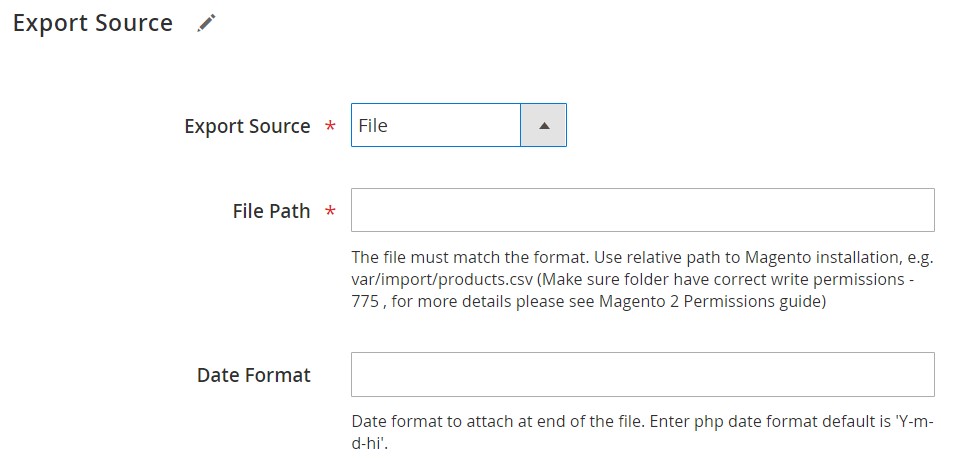
As you can see, transferring data from Magento 2 to iCloud is intuitive and user-friendly.
Now, it’s time to tell a few more words about other features provided by the Improved Import & Export extension that simplify the Magento 2 iCloud integration.
Get Improved Import & Export Magento 2 Extension
Improved Import & Export Magento 2 Extension Features
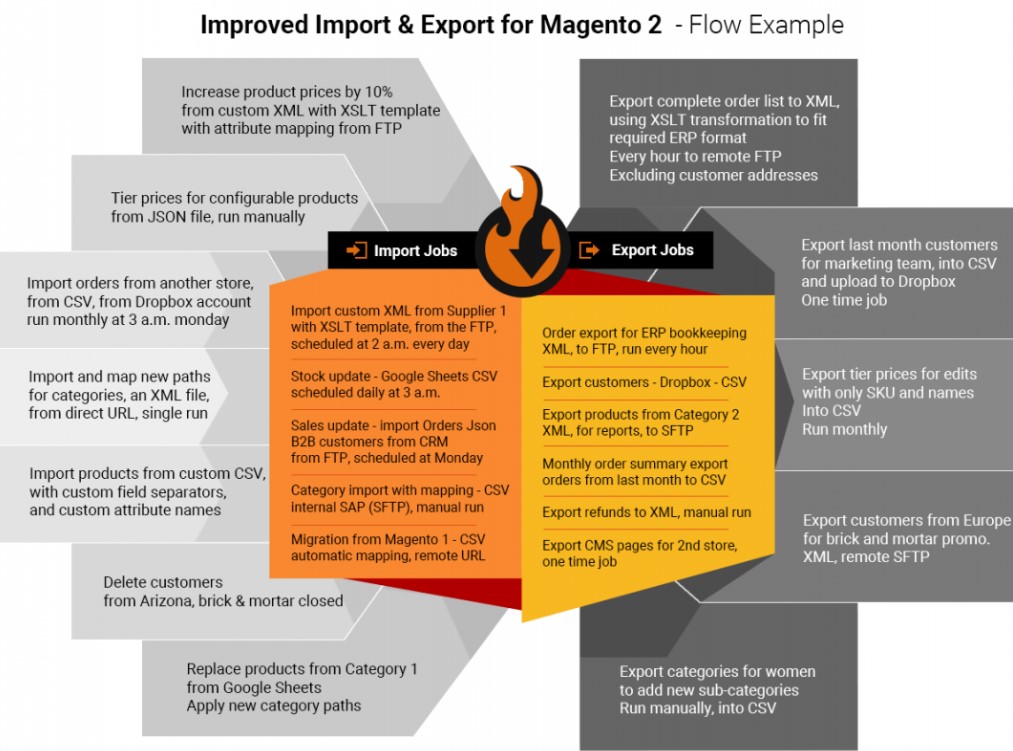
The requirements described above show that transferring data between your Magento 2 store and iCloud is only a tiny part of the problem. The more important aspect is the automation of continuous processes. To make the synchronization more user-friendly and entirely automated, multiple more features are required, and they are represented in the Improved Import & Export extension. Let’s see how our tool improves multiple aspects of import and export processes between Magento 2 and iCloud.
Automated Import & Export
Data transfers between Magento 2 and iCloud or another external system can become extremely time-consuming. If the automation is not available, you should run every transfer manually. And the more operations you perform, the less free time you get. Luckily, the Improved Import & Export module will prevent you from that. Our extension offers two different ways to automate data transfers: via schedules or event-based triggers. Other features are also developed with automation in mind, so it is possible to eliminate interactions with the module for daily data transfers.
Schedules
Due to the cron support, Improved Import & Export allows creating fully independent update schedules that can be used for transferring data between iCloud and Magento 2. Set a custom interval or choose one of the predefined update schemes which can be manually tailored to your needs.
If you still want or need to do everything manually, create profiles with no schedules. They are especially useful if one transfer is enough or some asynchronous actions are required. At the same time, the Improved Import & Export provides the ability to launch every scheduled profile manually whenever you want. With asynchronous data transfers, delayed updates are no longer a problem. If a partner uploads a data file to iCloud after a scheduled update, you can transfer it into your database manually.
Below, you can see how schedules are configured:
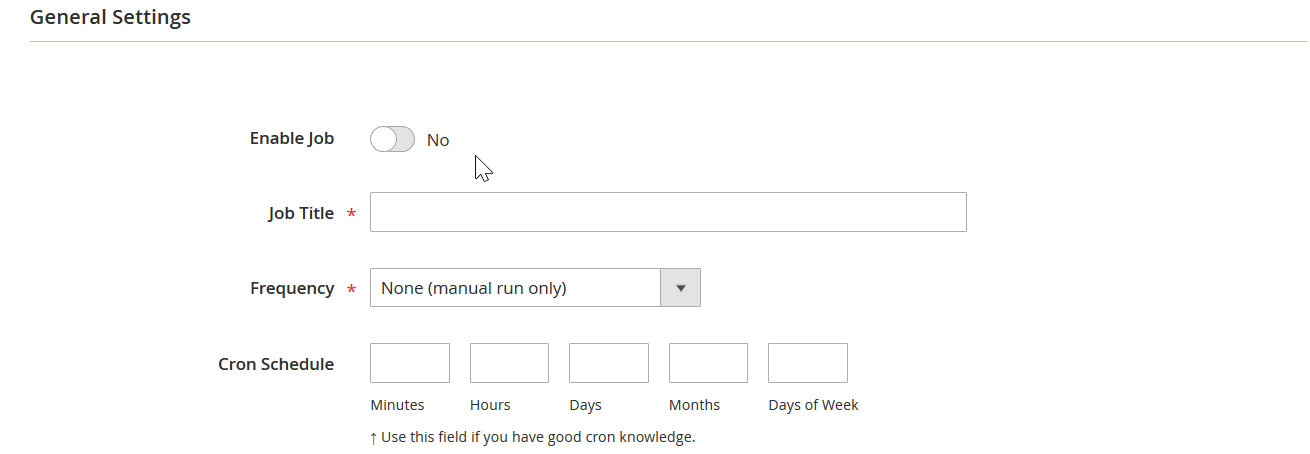
Events
Event-based triggers represent the second way of automating data transfers. Below, you can find a small export case that illustrates the feature. A trigger for a newly placed order launches an export process; which, in its turn, transfers order data to iCloud. That’s it! The same functionality can be leveraged for import processes. For further information, check this post: How to Run Magento 2 Import or Export After Specific System Event or Process.
Advanced Mapping Features
Unfortunately, schedules and event-based triggers are not enough to automate data transfers entirely. For both import and export processes, you should solve the problem of different attribute standards to be able to run transfers automatically. Therefore, the mapping opportunities of the Improved Import & Export Magento 2 extension dramatically simplify every data transfer between Magento 2 and iCloud, Dropbox, Box, and other file storages and connection points. Without the plugin, you still have to spend hours of time editing everything manually right in a data file. But how does the module change everything?
Mapping Presets
With the Improved Import & Export extension, you can solve the problem in just a few clicks. Our module offers mapping presets – predefined mapping schemes developed by our specialists. Select and apply a preset related to your integration, and our extension will do all the work for you. That’s it! The problem of different attribute standards can be literally fixed in several clicks.
From the perspective of the extension, it analyzes input files and matches attributes available there to the ones used in Magento. As a result, you don’t have to do that manually saving tons of time and effort. Also, note that a predefined matching scheme is applied to further updates automatically. You can select a preset in the following way:
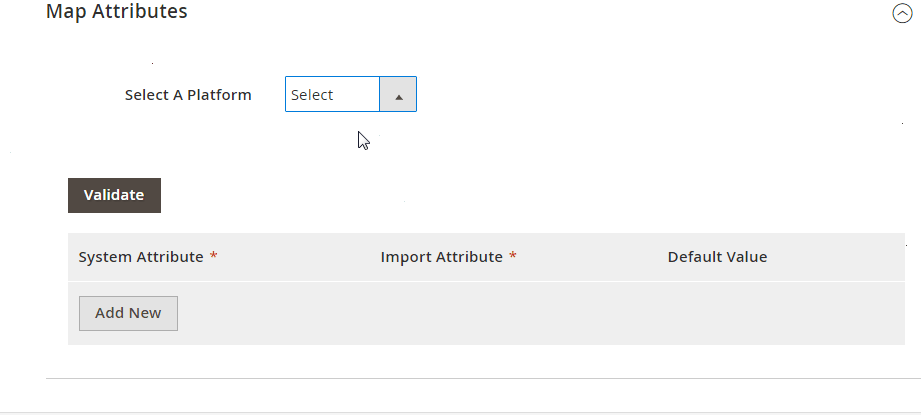
Matching Interface
Alternatively, you can use the Improved Import & Export Magento 2 extension to map external attributes to the corresponding internal ones right within the Magento admin. There is a separate matching interface in every import and export job. Although applying changes there is not as fast as applying a preset; you replace manual data editing in a file editor and, consequently, save time.
Manual attributes editing in your admin is helpful when there is no preset that satisfy your needs. At the same time, you can use it take full control over mapping. Being a very straightforward and intuitive process, manual editing looks as follows:
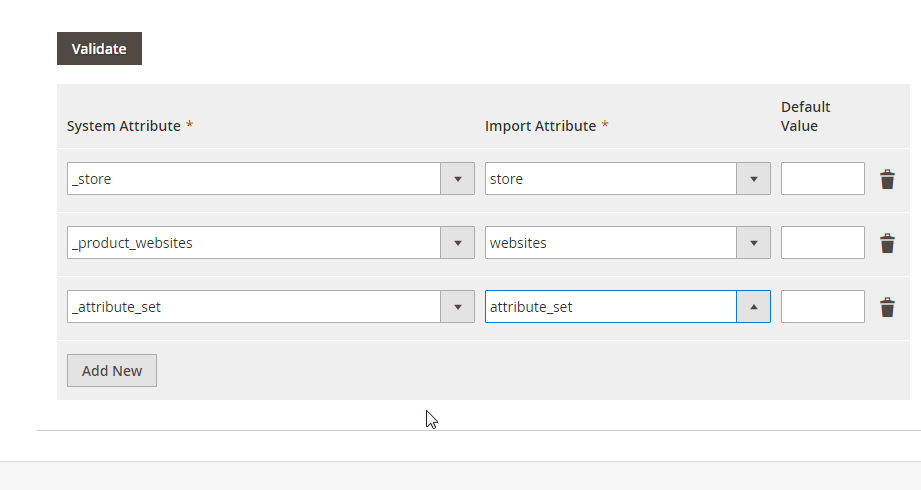
As for the “Default Value” column from the example above, it is designed to specify default (hardcoded) values, which are provided to all items related to a corresponding attribute. Let’s imagine a situation when you need to import products from different store views to a single one. The easiest way to do so is to specify a hardcoded value for the “_store” attribute. Next, the module will do all the work for you. It is also necessary to mention that all created mapping schemes are saved and applied for further updates. As a result, the Improved Import & Export extension allows you to automate data exchanges entirely. But what about unsupported attribute values, you will ask?
Attribute Values Mapping
With the Improved Import & Export Magento 2 extension, you can match not only attributes but also their values and save created schemes for future updates! Thus, all designations that prevent import processes are replaced automatically.
The process of attribute values mapping is as intuitive as the one described above: you choose a third-party value and specify the internal one in front of it. Repeat the procedure until all external designations are replaced. That’s it! For further information, follow this link: Attribute Values Mapping.
Attribute Values Editing
If attribute values editing is not enough, there is another feature designed to simplify your interaction with this type of data. The Improved Import & Export extension lets you modify attribute values in bulk. Apply the following rules to provide attribute values with a new form:
- Add a prefix to multiple attribute values;
- Add a suffix to multiple attribute values;
- Split multiple attribute values;
- Merge multiple attribute values.
Note that you can combine these rules and create conditions to apply changes more efficiently. You will find more information about attribute values editing here: How to Modify Attribute Values During Import and Export in Magento 2.
Category Mapping
In case you import product data from iCloud to Magento 2, the Improved Import & Export Magento 2 extension will help you eliminate inconveniences caused by third-party categories. Our module allows matching external product categories to ones used in your catalog.
Since an external catalog may have a unique structure, you need to do something with that before running the import process. Otherwise, the newly imported products won’t be imported according to the order used on your website. The Improved Import & Export extension allows match external product categories to ones used internally in the following way:
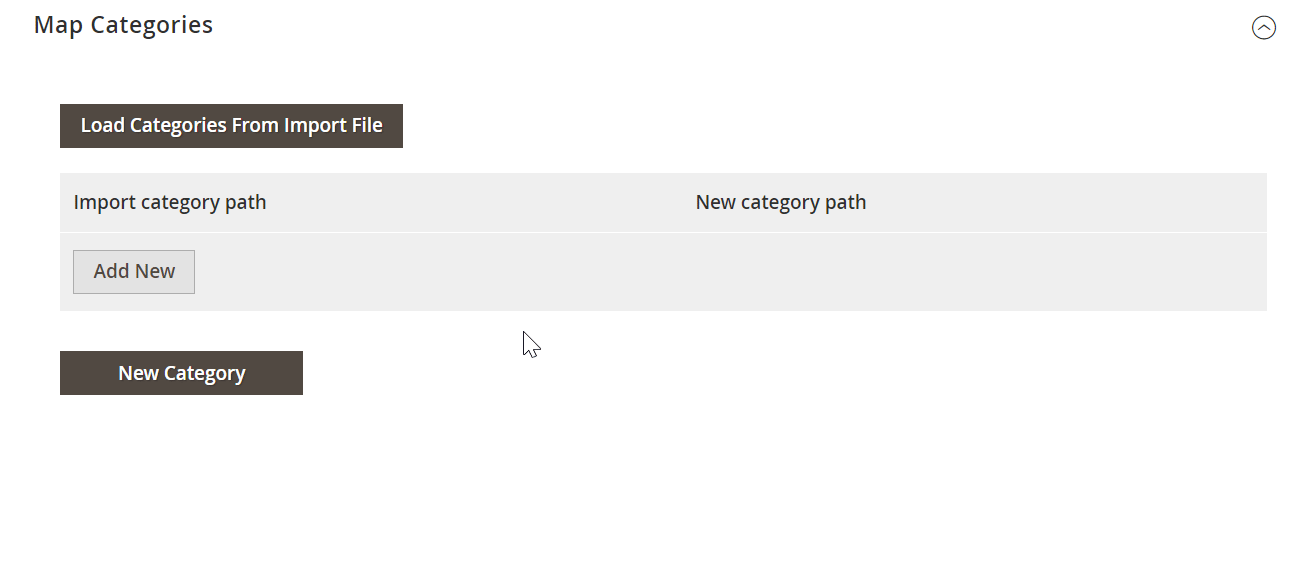
And you can create new categories on the fly. To do that, select a parent category and specify a new one. Consequently, a missing section will be added to your catalog on the fly. Follow this link to explore both features: Category Mapping.
Attributes On The Fly
Another quite frequent problem that occurs during import processes is the lack of attributes in a data file. Luckily, the Improved Import & Export Magento 2 extension provides a solution. With our module, you can create attributes on the fly via the following general form:
Attribute|attribute_property_name:attribute_property_value|…
For further information, check this article: Product attributes import.
Extended Connectivity Options
Last but not least, the Improved Import & Export Magento 2 module provides the ability to leverage multiple file standards and alternative ways of data transfers while the default tools work with CSV files only.
Multiple File Standards
Our extension dramatically increases the number of supported file formats in comparison to the default import/export tools. With our plugin, you can effortlessly transfer XML, JSON, ODS, and Excel files between Magento 2 and iCloud. Furthermore, data files of these types can be imported in a compressed form!
Multiple File Sources
The support for multiple sources is another vital feature that adds more flexibility when it comes to file transfers. The following connection points are provided:
- FTP/SFTP. With this feature, you can transfer files using a local or remote server.
- Dropbox. A Dropbox account can be used instead. Alternatively, you can rely on Box, OneDrive, Google Drive, iCloud, and Amazon Drive.
- URL. If you only need to import files, it is possible to specify a URL.

Alternative Ways of Import & Export
As for alternative ways of import and export, the Improved Import & Export Magento 2 extension allows replacing file exchanges with data transfers based on API connections or intermediary services. Thus, you can rely on REST, SOAP, and GraphQL APIs connecting your e-commerce website to external systems. Note that API connections fully support mapping, scheduling, and other extension features.
As for intermediary services, the Improved Import & Export Magento 2 extension works with Google Sheets, Office 365 Excel, and Zoho Sheet. The following image illustrates the integration on the basis of Google Sheets:
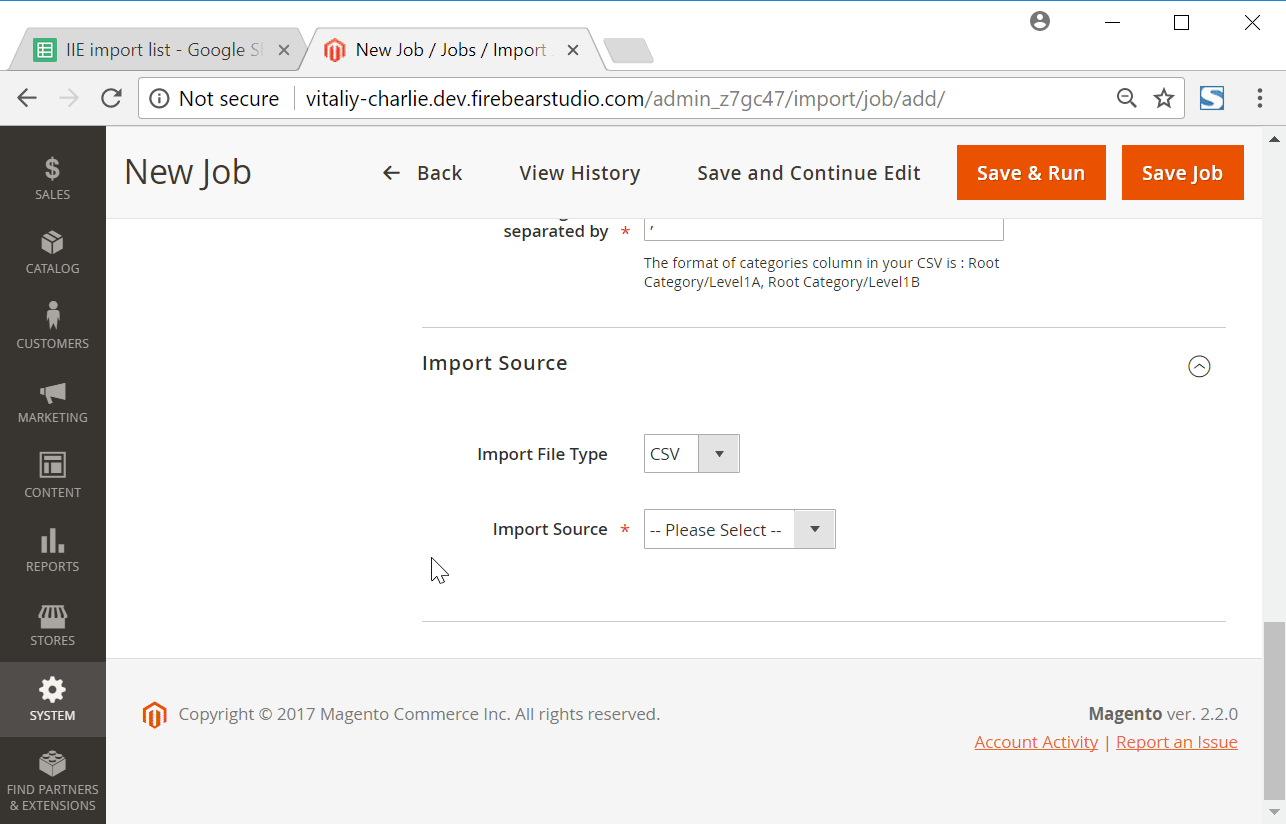
Watch the following video to see the extension in action:
Final Words
The Magento 2 iCloud integration is no longer a problem since it can be easily established with the Improved Import & Export extension. Export data from your e-commerce store to Apple’s file storage and move it back in a fully automated manner. Forever forget about manual data files editing and daily transfers. Our extension will help you connect Magento, iCloud and other systems that take part in the exchange and make the entire data flow fully automated. For further information, follow the link below and contact our support:
Get Improved Import & Export Magento 2 Extension









